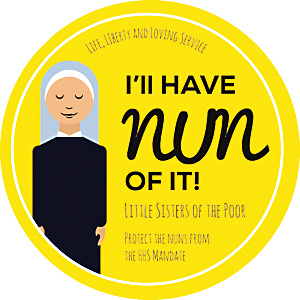WASHINGTON (CNS) – Visuals often are much easier to grasp than a complicated thicket of issues. That may be why the Little Sisters of the Poor have become the public face of Zubik v. Burwell, which goes before the U.S. Supreme Court March 23.
Zubik is not just about the religious order’s legal challenge of the Obama administration’s contraceptive mandate for employers. It is a consolidated case also involving East Texas Baptist University, Southern Nazarene University and Geneva College, which is a Presbyterian institution, as well as Catholic entities, including the Archdiocese of Washington, the dioceses of Pittsburgh and Erie, Pennsylvania, and Priests for Life.
Both sides on the mandate issue have been working to attract public support. The Little Sisters, like Priests for Life, have launched a website explaining their side of the issue, and of any of the cases the Little Sisters suit has received the most attention, media and otherwise. They are receiving help from The Becket Fund for Religious Liberty, a non-profit, public-interest legal and educational institute with a mission to protect the free expression of all faiths. To rally support for their efforts, the Little Sisters and the Beckett Fund are offering buttons which read “I’ll have nun of it,” available on the order’s website www.littlesistersofthepoor.org.
In January, two Little Sisters sat in the House Chamber for the State of the Union address, invited by House Speaker Paul Ryan, R-Wisconsin. The religious order also has been invoked on the campaign trail for the Republican presidential nomination by U.S. Sen. Marco Rubio, R-Florida, and former Florida Gov. Jeb Bush. Rubio and Bush, who is now out of the race, pointed to the order’s mandate suit as part of the ongoing fight for religious liberty.
Pope Francis met with some of the sisters in Washington last September during his apostolic visit.
Once the high court hears oral arguments in Zubik v. Burwell, a decision is expected before the court term ends in June.
With the death of Associate Justice Antonin Scalia, it is widely predicted the result will be a 4-4 tie. In the 2014 Hobby Lobby case, Scalia provided the deciding vote in a 5-4 decision, and two private, for-profit companies that objected to the mandate on moral grounds prevailed in their argument that complying placed an undue burden on their religious freedom. The court ruled that closely held companies – meaning, with limited shareholders – are exempt.
Refusing to comply with the mandate means substantial fines, which in the case of the Little Sisters have been estimated at $70 million a year. According to the Becket Fund for Religious Liberty, which represents the religious order, the fines range depending on the nursing facility run the order, which has close to 30 homes for the elderly. Some fines could run $2,000 per employee per year or amount to $100 per employee per day.
The USCCB brief argues that the Little Sisters order would face “financial ruin” as a result. “No one benefits from such an outcome – not the organizations, their donors, their clients, or their employees.”
As for “substantial burden,” the amicus brief from former state attorneys general in support of HHS maintains that the onus does not exist, since religious organizations would not even be informed of which of their employees are receiving contraceptive coverage.
What happens if the Supreme Court deadlocks 4-4? The rulings of the lower courts would be affirmed or the court may set the case aside for re-argument when Scalia’s seat is filled, predicted Rienzi, an attorney for the Little Sisters. If so, “we can come back in a year,” he told CNS.
(Copyright © 2016 Catholic News Service/United States Conference of Catholic Bishops. The CNS news services may not be published, broadcast, rewritten or otherwise distributed, including but not limited to, such means as framing or any other digital copying or distribution method in whole or in part, without prior written authority of Catholic News Service.)
